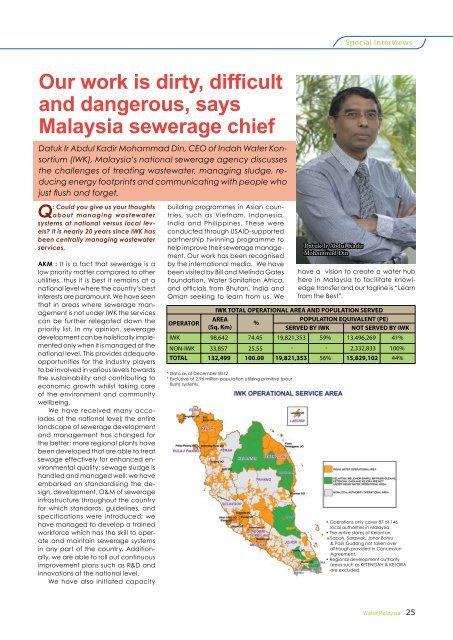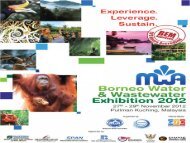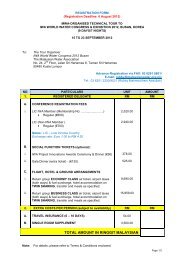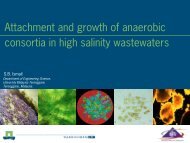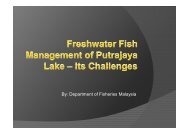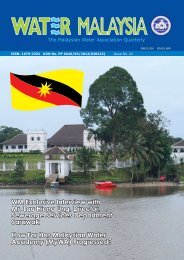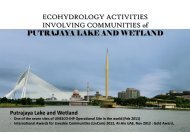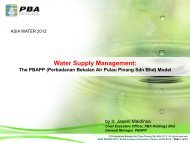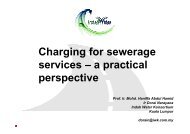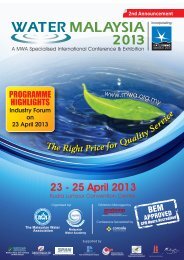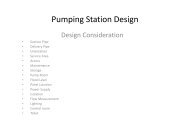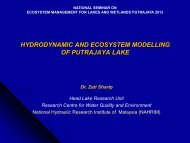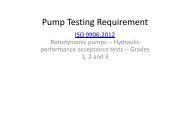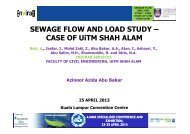Returning Malaysia's Rivers To L - Malaysian Water Association.
Returning Malaysia's Rivers To L - Malaysian Water Association.
Returning Malaysia's Rivers To L - Malaysian Water Association.
You also want an ePaper? Increase the reach of your titles
YUMPU automatically turns print PDFs into web optimized ePapers that Google loves.
Special Interviews<br />
Our work is dirty, difficult<br />
and dangerous, says<br />
Malaysia sewerage chief<br />
Datuk Ir Abdul Kadir Mohammad Din, CEO of Indah <strong>Water</strong> Konsortium<br />
(IWK), Malaysia’s national sewerage agency discusses<br />
the challenges of treating wastewater, managing sludge, reducing<br />
energy footprints and communicating with people who<br />
just flush and forget.<br />
Q<br />
: Could you give us your thoughts<br />
about managing wastewater<br />
systems at national versus local levels?<br />
It is nearly 20 years since IWK has<br />
been centrally managing wastewater<br />
services.<br />
AKM : It is a fact that sewerage is a<br />
low priority matter compared to other<br />
utilities, thus it is best it remains at a<br />
national level where the country’s best<br />
interests are paramount. We have seen<br />
that in areas where sewerage management<br />
is not under IWK the services<br />
can be further relegated down the<br />
priority list. In my opinion, sewerage<br />
development can be holistically implemented<br />
only when it is managed at the<br />
national level. This provides adequate<br />
opportunities for the industry players<br />
to be involved in various levels towards<br />
the sustainability and contributing to<br />
economic growth whilst taking care<br />
of the environment and community<br />
wellbeing.<br />
We have received many accolades<br />
at the national level; the entire<br />
landscape of sewerage development<br />
and management has changed for<br />
the better; more regional plants have<br />
been developed that are able to treat<br />
sewage effectively for enhanced environmental<br />
quality; sewage sludge is<br />
handled and managed well; we have<br />
embarked on standardising the design,<br />
development, O&M of sewerage<br />
infrastructure throughout the country<br />
for which standards, guidelines, and<br />
specifications were introduced; we<br />
have managed to develop a trained<br />
workforce which has the skill to operate<br />
and maintain sewerage systems<br />
in any part of the country. Additionally,<br />
we are able to roll out continuous<br />
improvement plans such as R&D and<br />
innovations at the national level.<br />
We have also initiated capacity<br />
building programmes in Asian countries,<br />
such as Vietnam, Indonesia,<br />
India and Philippines. These were<br />
conducted through USAID-supported<br />
partnership twinning programme to<br />
help improve their sewerage management.<br />
Our work has been recognised<br />
by the international media. We have<br />
been visited by Bill and Melinda Gates<br />
Foundation, <strong>Water</strong> Sanitation Africa,<br />
and officials from Bhutan, India and<br />
Oman seeking to learn from us. We<br />
OPERATOR<br />
Datuk Ir Abdul Kadir<br />
Mohammad Din<br />
IWK TOTAL OPERATIONAL AREA AND POPULATION SERVED<br />
IWK 98,642 74.45 19,821,353 59% 13,496,269 41%<br />
NON-IWK<br />
TOTAL<br />
AREA<br />
(Sq. Km)<br />
33,857 25.55 - -<br />
132,499 100.00<br />
* Data as of December 2012<br />
* Exclusive of 2.96 million population utilizing primitive (pour<br />
flush) systems.<br />
%<br />
have a vision to create a water hub<br />
here in Malaysia to facilitate knowledge<br />
transfer and our tagline is “Learn<br />
from the Best”.<br />
POPULATION EQUIVALENT (PE)<br />
SERVED BY IWK NOT SERVED BY IWK<br />
2,332,833<br />
19,821,353 56% 15,829,102<br />
100%<br />
44%<br />
• Operations only cover 87 of 146<br />
local authorities in Malaysia.<br />
• The entire states of Kelantan,<br />
Sabah, Sarawak, Johor Bahru<br />
& Pasir Gudang not taken over<br />
although provided in Concession<br />
Agreement.<br />
• Regional development authority<br />
areas such as KETENGAH & KEJORA<br />
are excluded.<br />
<strong>Water</strong>Malaysia 25


